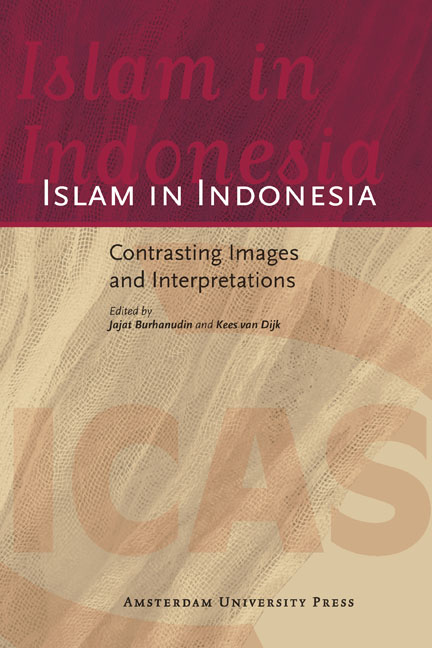Book contents
- Frontmatter
- Contents
- Introduction
- 1 Comparing Different streams of Islam: Wrestling with Words and Definitions
- 2 Defining Indonesian Islam: An Examination of the Construction of the National Islamic Identity of Traditionalist and Modernist Muslims
- 3 Indonesia in the Global Scheme of Islamic Things: Sustaining the Virtuous Circle of Education, Associations and Democracy
- 4 Distinguishing Indonesian Islam: Some Lessons to Learn
- 5 Islam, State and Society in Democratising Indonesia: A Historical Reflection
- 6 The Politics of Piety in the Pondok Pesantren Khusus Waria Al-Fattah Senin-Kamis Yogyakarta: Negotiating the Islamic Religious Embodiment
- 7 The Indonesian Muslim Feminist Reinterpretation of Inheritance
- 8 Managing Familial Issues: Unique Features of Legal Reform in Indonesia
- 9 A new Generation of Feminists within Traditional Islam: An Indonesian Exception
- 10 Religious Pluralism and Contested Religious Authority in Contemporary Indonesian Islam: A. Mustofa Bisri and Emha Ainun Nadjib
- 11 Islam and Humanitarian Affairs: The Middle Class and New Patterns of Social Activism
- 12 Dakwah radio in Surakarta: A Contest for Islamic Identity
- 13 Muslim Fundamentalism in Educational Institutions: A Case Study of Rohani Islam in High Schools in Cirebon
- 14 Majlis Tafsir Al-Qur’an and its Struggle for Islamic Reformism
- Glossary
- About the Editors and Contributors
- Bibliography
- Index
- Monographs
1 - Comparing Different streams of Islam: Wrestling with Words and Definitions
Published online by Cambridge University Press: 09 January 2021
- Frontmatter
- Contents
- Introduction
- 1 Comparing Different streams of Islam: Wrestling with Words and Definitions
- 2 Defining Indonesian Islam: An Examination of the Construction of the National Islamic Identity of Traditionalist and Modernist Muslims
- 3 Indonesia in the Global Scheme of Islamic Things: Sustaining the Virtuous Circle of Education, Associations and Democracy
- 4 Distinguishing Indonesian Islam: Some Lessons to Learn
- 5 Islam, State and Society in Democratising Indonesia: A Historical Reflection
- 6 The Politics of Piety in the Pondok Pesantren Khusus Waria Al-Fattah Senin-Kamis Yogyakarta: Negotiating the Islamic Religious Embodiment
- 7 The Indonesian Muslim Feminist Reinterpretation of Inheritance
- 8 Managing Familial Issues: Unique Features of Legal Reform in Indonesia
- 9 A new Generation of Feminists within Traditional Islam: An Indonesian Exception
- 10 Religious Pluralism and Contested Religious Authority in Contemporary Indonesian Islam: A. Mustofa Bisri and Emha Ainun Nadjib
- 11 Islam and Humanitarian Affairs: The Middle Class and New Patterns of Social Activism
- 12 Dakwah radio in Surakarta: A Contest for Islamic Identity
- 13 Muslim Fundamentalism in Educational Institutions: A Case Study of Rohani Islam in High Schools in Cirebon
- 14 Majlis Tafsir Al-Qur’an and its Struggle for Islamic Reformism
- Glossary
- About the Editors and Contributors
- Bibliography
- Index
- Monographs
Summary
Writing or speaking about ‘Indonesian Islam’ or ‘Islam in Indonesia’, we encounter a problem. The phrase is somewhat ambiguous. How are we to understand the combination of these words? At first glance, the meaning of the phrase seems obvious, referring as it does to Islam as it manifests itself in Indonesian society. In the realm of religion – its institutions, theological and intellectual discussions and day-to-day practices – its meaning appears to be straightforward; though there remains a recurrent discussion, which can flare up at almost any moment, about whether some of the practices followed or ideas expressed are Islamic or not. Once one leaves the field of religion proper, however, the matter becomes more complicated. About 90 per cent of Indonesians are Muslim and Islam permeates Indonesian society and its social and political intercourse. This is widely acknowledged, and it is common for studies to remark upon how religious, or tolerant of religion, Indonesian society is; or to note that some Indonesian Muslims are less devoted to Islam or hold beliefs that date from pre-Islamic times.
The latter are often erroneously presented as nominal Muslims or KTP (Karta Tanda Penduduk, identity card) Muslims, and such terminology indicates that when people speak about Islam in Indonesia or Indonesian Muslims, more often than not they only have a particular segment of Indonesian society in mind to the exclusion of others. For want of better words, they tend to concentrate on the devout, the deeply devout or the orthodox Islamic community. For instance, there are frequent discussions on developments in Muhammadiyah and the Nahdlatul Ulama, or the social, religious and political role of such social organisations in Indonesian society. Others select the Masjumi, the PPP (Partai Persatuan Pembangunan), the PKS (Partai Keadilan Sejahtera) and other Islamic political parties as the topic of their analysis, or deal with radical groups such as the FPI (Front Pembela Islam) and the MMI (Majelis Mujahidin Indonesia). By contrast, the PNI (Partai Nasional Indonesia), the Partai Demokrat or Golkar are rarely the focus of research, something I believe to be a serious oversight.
Many scholars, whether writing about the last decades of Dutch colonial rule, the struggle for independence or more recent political developments, have called attention to the tension or strife between nationalist organisations or leaders and their Islamic counterparts.
- Type
- Chapter
- Information
- Islam in IndonesiaContrasting Images and Interpretations, pp. 15 - 24Publisher: Amsterdam University PressPrint publication year: 2013



